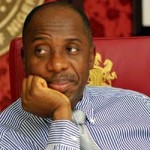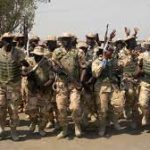OPINION – Recession: Is the Worst Really Over?
African News, Featured Contributors/Columnists, Latest Headlines Thursday, September 22nd, 2016By Jideofor Adibe
BALTIMORE, MD (AFRICAN EXAMINER) – With Nigerians waddling through what is generally regarded as the country’s worst economic crisis in over two decades, the CBN Governor, Godwin Emefiele, has just dangled what some would regard as a ray of hope to suffering Nigerians. Speaking while playing host to members of the Newspaper Proprietors Association of Nigeria recently, the CBN Governor reportedly told them that Nigerians had seen the worst of the economic crisis and that the economy would be fully out of recession by December this year and would be on a part of growth. The apex bank governor was quoted as saying: “I repeat, the worst is over, Nigeria’s economy is on the path of recovery and growth. If you are a bystander, you are losing… join the train now before it leaves you.”
The first impulse is to yawn. We have heard this sort of apparently ‘unfounded optimism’ several times before from government officials, haven’t we? Governments at every level in this country have a penchant for claiming that their policies are the magic elixir that would usher the elusive el Dorado that their predecessors in office failed to actualize. I believe that bogus promises are among the reasons for the deep distrust of governments across the world. In countries like the US, this distrust of government is one of the bases for their fierce defence of the freedom of speech. One of the arguments of free speech advocates is that it is only through unfettered competition of ideas in the political marketplace and the freedom to ‘interrogate all interrogatables’ that the truth can emerge. So can Emefiele’s bold assertion that the worst is over hold up to scrutiny?
One of the bases for the CBN Governor’s optimism is his claim that the liberalisation of the foreign exchange (Forex) market had begun to pay off. He claimed that the country had recorded $1 billion capital inflows from foreign investors since the market took off almost three months ago. In our highly import dependent economy, there is no doubt that the forex crisis (typified by the massive depreciation in the value of the naira against the major currencies) is both a cause and effect of the economic crisis. So a cynic can legitimately ask: if there has been inflow of over $1bn dollars since the liberalization of the forex why has the naira not begun appreciating or stabilizing in value? Another legitimate question is whether the disparity between the official exchange rate and the parallel market rate has not created a huge opportunity for arbitrage and round-tripping, which in turn are disincentives for investing in the productive sectors of the economy? Supporters of the CBN would counter that the policy is still working through the system and that the apex Bank is working on the unintended consequences of that liberalisation. The point to be noted here however is that every major policy often holds good opportunities of turning things around just as its unintended consequences could also derail such a policy – no matter how sound such a policy may be at the theoretical level.
Despite legitimate grounds for scepticisms over the government’s claims, I have some grounds for sharing in the CBN’s optimism:
One is the apparent increasing self confidence of the CBN Governor. This is typified by the decision to hold the interest rate unchanged at 14 per cent – despite criticisms, including from very influential quarters,(such as the Finance Minister who publicly called for a cut in the interest rate) that such is undermining the need for the private sector to secure loans at cheap rates to reflate the economy. In the past the CBN indulged in many policy somersaults – often abandoning policies once they came under barrage of criticisms – rather than having the nerve to see such policies work through the system. Though no one can be very sure in an environment like ours with many intervening variables if any policy introduced would work or not, I see the decision of the CBN Governor not to lower the interest rate as demonstrating a new found confidence and therefore commendable. It is also possible he had just secured more legroom to operate. In holding the MPR steady at 14 percent (the MPR is the rate at which the CBN lends to commercial banks and often determines the cost of funds in the economy), the CBN argued that to further lower the rate would worsen inflationary conditions. It also argued that in the past the MPC had cut rates to encourage lending to the private productive sectors but found that rather than the banks using the available liquidity to provide credit to agriculture and manufacturing sectors, the rate cuts only “provided opportunities for lending to traders who deployed the same liquidity in putting pressure on the foreign exchange market which had limited supply thus pushing up the exchange rate.” On the argument that cutting interest rate would help the public sector to borrow at lower rates to boost consumption and investment spending, the CBN argued that “while it was expected to stimulate growth through aggressive spending, doing so without corresponding efforts to boost industrial output by taking actions to deepen foreign exchange supply for raw materials will not help reduce unemployment, nor would it boost industrial capacity.”
I am not so much persuaded by the CBN’s arguments as by the confidence displayed – given the calibre of the critics of the CBN’s interest rate policy (I was one of the critics). The CBN also told the newspaper owners that it would take more than managing monetary policies to get the country out of recession and called on the fiscal authorities to improve fiscal activities “especially the active implementation of the 2016 Federal Budget and payment of salaries by states and local governments”. The apex bank equally called for tax incentives to stimulate both the supply and demand sides of economic activities.
I feel that the Finance Minister and the CBN having divergent views in public on interest rates is healthy – though it would have been better if they had debated their positions behind closed doors and reconciled such. What this seems to suggest however is that the two authorities are beginning to find their voices. A few months ago, this would probably not have happened.
Two, another source of optimism for me is the apparent increasing realisation by the President that he has no magic wand that will solve the country’s economic problems overnight and that there are limitations to what his charisma (or famed body language) could do. This is evident in some of the noticeable changes about him. For instance he is no longer vocally critical of devaluation of the Naira. More importantly, he was reportedly praised by Obama for the country’s new forex policy. And Nigerian leaders love it when they are praised by leaders of the major world powers, especially by leaders of the USA and the UK! The cumulative impact of these may be that the President will become less meddlesome in affairs of the Bank as the media often accused him of doing. This will in turn give both the monetary and fiscal authorities more room to engage in robust idea exchanges.
Three, there is also evidence that the President is gradually softening his politics and rhetoric – even if slowly. I had in one of my articles argued that some of our current economic challenges are in part the economic manifestations of the president’s hard politics. Some of his politics such as his approach to the Niger Delta issue and his government’s constant demonization of former President Jonathan arguably helped to create the Avengers whose activities in turn helped to cut the country’s oil production at a time of low prices. As the President softens his politics, it is likely to impact positively on some of the underlying political bases of the current economic crisis. I have argued variously that system dynamics would eventually humanize the President and turn him into a statesman.
Four, another major source of optimism for me is the resilience of Nigerians and their adaptability to circumstances. The country has since adapted to hanging perpetually on the cliff. While the country is often said to be tough, Nigerians pride themselves in being made of malleable irons. Nigerians survived the IMF/World Bank imposed structural adjustment programme of the mid 1980s and early 1990s. Already there are emerging coping strategies to the current economic crisis.
Five, while some of the CBN’s positions such as its support for the partial sale of some state assets will remain controversial – given the experiences of such asset disposals under Obasanjo – the logic of life would seem to support its assertion that he who is down needs not fear further fall. As the CBN Governor put it: “We are already in the valley, the only direction is to go up to the hill and government is doing everything possible to move up the hill as quickly as possible.”
Email: pcjadibe@yahoo.com
Twitter: @JideoforAdibe
Related Posts
Short URL: https://www.africanexaminer.com/?p=35647






















